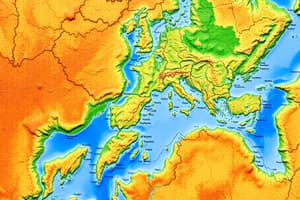Podcast
Questions and Answers
Hvilket emne er fokusert på mennesker og deres interaksjon med miljøet?
Hvilket emne er fokusert på mennesker og deres interaksjon med miljøet?
- Fysisk geografi
- Hydrologi
- Jordgeografi (correct)
- Atmosfærisk geografi
Hva er et eksempel på en karriere som bruker fysisk geografi?
Hva er et eksempel på en karriere som bruker fysisk geografi?
- Sosiolog
- Økonom
- Psykolog
- Meteorolog (correct)
Hvilken geografiske disiplin fokuserer på landformer, økosystemer og klimatiske mønstre?
Hvilken geografiske disiplin fokuserer på landformer, økosystemer og klimatiske mønstre?
- Fysisk geografi (correct)
- Politisk geografi
- Human geography
- Kultur geografi
Hvilket begrep i fysisk geografi refererer til prosessen med avsetning av partikler av jord, stein og mineraler?
Hvilket begrep i fysisk geografi refererer til prosessen med avsetning av partikler av jord, stein og mineraler?
Hva studerer meteorologer innenfor fysisk geografi?
Hva studerer meteorologer innenfor fysisk geografi?
Hva er et hovedfokus for human geografer?
Hva er et hovedfokus for human geografer?
Hvilke teknikker bruker human geografer for å analysere romlige mønstre og trender?
Hvilke teknikker bruker human geografer for å analysere romlige mønstre og trender?
Hva er et typisk datainnsamlingsverktøy som human geografer bruker?
Hva er et typisk datainnsamlingsverktøy som human geografer bruker?
Hvilket perspektiver integrerer human geografer for å generere innsikt i sosiale prosesser?
Hvilket perspektiver integrerer human geografer for å generere innsikt i sosiale prosesser?
Hvilken type ferdigheter er nødvendig for geografer i tillegg til analytiske evner?
Hvilken type ferdigheter er nødvendig for geografer i tillegg til analytiske evner?
Flashcards
Physical Geography
Physical Geography
The study of Earth's physical features and the processes that shape them, including landforms, ecosystems, and climate.
Human Geography
Human Geography
The study of humans and their interaction with the environment, including population, culture, and economics.
Drainage basins
Drainage basins
Areas of land that drain into a common river or lake system.
Erosion
Erosion
Signup and view all the flashcards
Deposition
Deposition
Signup and view all the flashcards
Climate Zones
Climate Zones
Signup and view all the flashcards
Vegetation Types
Vegetation Types
Signup and view all the flashcards
Relief
Relief
Signup and view all the flashcards
Sediment Transport
Sediment Transport
Signup and view all the flashcards
Research Assistant
Research Assistant
Signup and view all the flashcards
Study Notes
Physical Geography
Physical geography is concerned with understanding Earth's physical features and the processes that shape them. It covers a wide variety of topics, including landforms, ecosystems, atmospheric phenomena, water bodies, landscapes, biogeochemical cycles, soils, and global climatic patterns. Physical geographers study how these components interact and evolve through natural systems. Their work involves observing, measuring, recording, and interpreting earth's surface features, structures, materials, and processes.
In practical terms, the study of physical geography applies scientific principles and methodologies to address environmental challenges such as resource management, disaster risk reduction, conservation efforts, urban planning, and sustainable development. Examples of careers that utilize physical geography include hydrologists, meteorologists, oceanographers, glaciologists, ecologists, and climatologists.
Key concepts in physical geography include relief, drainage basins, erosion, deposition, sediment transport, weathering, climate zones, and vegetation types. Understanding these concepts requires a combination of field observations, laboratory experiments, and mathematical modeling.
Human Geography
Human geography focuses on the study of humans and their interaction with the environment. It encompasses themes such as population distribution, urbanization, economic activity, cultural practices, and social relationships. Human geographers seek to understand why certain regions prosper economically while others struggle, why people live where they do, and how societal dynamics influence the landscape.
Human geographers employ qualitative and quantitative techniques to analyze spatial patterns and trends. They collect data through surveys, ethnographic studies, remote sensing, and GIS technologies. By integrating perspectives from demography, economics, history, politics, and anthropology, human geographers generate insights into social processes and help shape policies on topics ranging from housing development to international trade agreements.
Interestingly, the role of a research assistant within the broader context of geography can involve a mix of both physical and human geography tasks. These might include contributing to scientific publications, presenting research outcomes, collaborating on interdisciplinary teams, and engaging with stakeholders outside academia. Additionally, geographers are required to have strong analytical skills, familiarity with statistical software packages, and proficiency in report writing, among other competencies.
Studying That Suits You
Use AI to generate personalized quizzes and flashcards to suit your learning preferences.
Description
Test your knowledge on physical and human geography by exploring concepts such as landforms, ecosystems, climate zones, population distribution, urbanization, and economic activity. Learn about how physical features interact with human societies and the environment in this comprehensive quiz.




